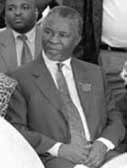| Mbeki
faces new challenges as new elections approach
|
by Ahmed Rufai
 (FinalCall.com)--The introduction of majority rule in South
Africa and the election of Nelson Mandela as the country�s first African
president was heralded world wide. In fact, many observers feel that if
there had been no constitutional provision that limited him to two terms
in office, Mr. Mandela would, perhaps, have remained in office, if he
chose to. He would have won such an election due to his charismatic and
unblemished record. Unlike most politicians world wide, he was uncorrupted
and was not linked directly or indirectly to any scandal. (FinalCall.com)--The introduction of majority rule in South
Africa and the election of Nelson Mandela as the country�s first African
president was heralded world wide. In fact, many observers feel that if
there had been no constitutional provision that limited him to two terms
in office, Mr. Mandela would, perhaps, have remained in office, if he
chose to. He would have won such an election due to his charismatic and
unblemished record. Unlike most politicians world wide, he was uncorrupted
and was not linked directly or indirectly to any scandal.
His successor, President Thabo Mbeki, seems to be facing the opposite
of such an achievement. Many analysts have raised questions on how Mr.
Mbeki, a technocrat believed to have been behind most of Mr. Mandela�s
policies, would carve his own niche after such charismatic statesman as
his predecessor. Mr. Mbeki succeeded in creating an image of his own. With
his leadership of the African National Congress (ANC) at stake at the end
of 2002, however, President Mbeki seems to stand the risk of being ousted
by his own party.
Questions are being raised as to whether he will be challenged for the
party�s leadership and whether he will win a second presidential contest
at the 2004 national elections. Such questions are normal between
elections in any democracy. But in South Africa, they were enlivened by
the declaration of Deputy President Jacob Zuma, who suddenly denied that
he planned to challenge Mr. Mbeki for the ANC leadership. Mr. Zuma
discounted vague rumors and "so-called intelligence reports"
suggesting that he might try to wrest control from Mr. Mbeki.
"I believe our current President is certainly capable of leading
both the ANC and the country," he declared, "and my confidence
in him remains unwavering."
This seemingly unsolicited declaration was Mr. Zuma�s response to
rumors of tense relations between him and the President, and some
observers do not see any reason to provoke his unusual statement. Other
analysts believe that he issued his denial as a preemptive effort to
achieve the reverse effect and to arouse public attention before declaring
his interest in Mr. Mbeki�s post.
Mr. Zuma is an astute tactician and former ANC intelligence chief,
which makes him an unlikely focus for party dissidents. Indications of his
rift with Mr. Mbeki came during the HIV/AIDS furor last year. He distanced
himself from the President�s questioning of a link between the virus and
the illness.
This year, Mr. Mbeki took away one of Mr. Zuma�s pet projects, a
development program for rural areas, and allocated it to his close ally,
Local Government Minister Sydney Mufamadi. In addition, Mr. Zuma appears
to side with those ANC members who, unlike Mr. Mbeki�s office, want to
bring in Judge Willem Heath, an official corruption investigator, to look
at an arms deal worth $5.4 billion (U.S.) by the South African Defense
Force.
The debate over the alleged corruption in the government�s $5.4
billion arms deal is damaging the ANC and raising questions about the
constitution�s rules on accountability. As some Western arms companies
and their agents involved in the deal have been linked to commission
payments and sanctions-busting in Asia and elsewhere in Africa, suspicion
is mounting that there might be something the government and the ANC is
hiding.
The opposition Democratic Alliance, led by Tony Leon and which includes
members and former ministers from the old apartheid National Party, has
continued to attack the ANC leadership over the issue, in spite of the
involvement of persons across party lines in the deal. In fact, some of
those involved link into the old apartheid military establishment and the
Ian Smith regime in the then-Rhodesia (now Zimbabwe).
Pres. Mbeki and Defense Minister Mosiuoa Terror Lekota insist that
current investigative structures involving the government�s Public
Prosecutors office is adequate to probe the deal. Critics, including some
key ANC members, insist the government wants to shut out Judge Willem
Heaths� Special Investigating Unit because it is too effective. Since
1997, the Heath Commission has recovered more than $40 million from deals
where it found evidence of corruption and misappropriation.
Justice Minister Penuel Maduna last year denounced the Heath Commission
for exceeding its mandate by trying to operate nationally instead of
restricting itself to investigating graft in the Eastern Cape provincial
government to which it was mandated. In November, a Constitutional Court
ruled that the Heath Commission could not serve simultaneously as a judge
and investigator. Heath Commission supporters say it has a staff with
corruption-busting expertise that would allow a rapid investigation of the
arms deal for which former Defense Minister Joe Modise and ANC chief
parliamentary Whip Tony Yengeni are alleged to have received kickbacks.
Both men have rejected the accusations. "I have very, very early
on dismissed these allegations with the contempt they deserve," says
Mr. Yengeni.
The allegations were first made by Patricia de Lille, a Pan Africanist
Congress (PAC) member of Parliament. Mrs. Lille had produced documents,
allegedly provided by concerned ANC members of parliament who suspected
corruption in the arms deal. She sent the documents to the Heath
anti-corruption unit.
But Justice Minister Maduna advised President Mbeki to exclude Justice
Heath from the arms inquiry, accusing the judge of "touting for
work." How far this scandal will affect the ANC and Mr. Mbeki�s
leadership remains to be seen.
|

![]()